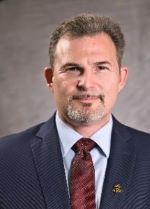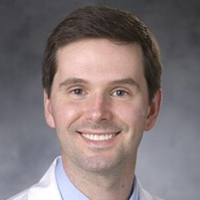
Jim Hokanson, PhD
Dr. Hokanson is assistant professor of the Joint Department of Biomedical Engineering at Marquette University and the Medical College of Wisconsin and director of the Pelvic Diagnostics and Therapeutic Laboratory. His research interests include urologic function and dysfunction; electrical stimulation and neuromodulation therapies; signal processing and machine learning; clinical diagnostics; autonomic nervous system and organ physiology; and neural engineering.

Giulia Ippolito, MD, MS
Dr. Ippolito is a urologist with fellowship training in female pelvic medicine and reconstructive surgery and a health services researcher at the University of Michigan. Dr. Ippolito’s clinical focus and practice include evaluating and treating urinary incontinence, neurogenic bladder, female pelvic floor dysfunction and reconstruction of the lower urinary tract, including ureteral obstruction. Her research is focused on understanding and improving decision-making between patients and clinicians, especially in the care of overactive bladder.
Adam Klausner, MD

Dr. Klausner is a neuro-urologist and professor of surgery and urology in the Virginia Commonwealth University School of Medicine. His clinical practice focuses on neuro-urology and voiding dysfunction; urinary incontinence; post-prostatectomy incontinence; disorders of bladder emptying; erectile dysfunction; and interstitial cystitis and bladder pain syndrome. Dr. Klausner has maintained a strong interest in basic science research and has collaborated with faculty in the Departments of Biochemistry and Mechanical Engineering, studying detrusor smooth muscle physiology.

Aaron Mickle, PhD
Dr. Mickle is an associate professor of physiology at the Medical College of Wisconsin. He leads a research program studying the neuronal mechanism of bladder dysfunction and pain. The group focuses on developing better treatments for bladder disorders such as overactive bladder, bladder pain syndrome, and bladder dysfunction following spinal cord injury. They work on research tool development, implantable biomedicine treatments, and validating new pharmacological targets for treating these diseases.

David Page, PhD
Dr. Page is Chair of the Department of Biostatistics and Bioinformatics at Duke University. He completed his PhD in Computer Science at the University of Illinois at Urbana-Champaign, where his dissertation focused on theoretical aspects of machine learning. He became involved in biomedical applications of machine learning while a postdoc at Oxford University. During his 20 years at the University of Wisconsin-Madison, Dr. Page supervised 17 PhDs and 3 postdocs who went on to become scientists at Google, Amazon, Facebook, Yale, and the Carbone Cancer Center, as well as faculty at Carnegie-Mellon, Catholic University of Leuven, Michigan, Case Western, UCLA, Minnesota State, and Wisconsin. He has also supervised multiple master’s students, including now-current PhD students at Duke, Princeton, and MIT.

Susannah Rose, PhD
Dr. Rose is an ethicist and a mixed methods researcher specializing in patient experience and the ethics of AI in health care. She is an associate professor at Vanderbilt University Medical Center (VUMC) in the Department of Biomedical Informatics and the Department of Health Policy, and core faculty in the Center for Biomedical Bioethics and Society. Dr. Rose serves as the vice chair of the VUMC Artificial Intelligence Technology Committee that governs AI models within the organization, and she also the executive director of the AI Discovery and Vigilance to Accelerate INnovation and Clinical Excellence (ADVANCE) Center.

Jonathan C. Routh, MD, MPH, FAAP
Dr. Routh is a pediatric urologist and health services researcher at Duke University School of Medicine, where he serves as the Chief of Children’s Surgery and is the Paul H. Sherman Distinguished Associate Professor of Surgery, Pediatrics, and Population Health Sciences. His clinical and research interests include minimally-invasive surgery, complex urologic reconstruction (particularly in children with spina bifida and neurogenic bladder), surgical and non-surgical management of children with disorders of sex development, and pediatric urologic oncology. He is currently an Associate Section Editor for the Journal of Urology, the Chair of the Steering Committee for the Urologic Management to Preserve Initial Renal Function Protocol for Young Children with Spina Bifida (UMPIRE) study, and the co-PI at Duke for both UMPIRE and the National Spina Bifida Patient Registry. Dr. Routh has extensive experience as a mentor and currently serves as a formal mentor for Duke’s KURe K12 and the UrogynCREST R25 programs; his list of mentees includes 4 undergraduate students, 10 medical students, 10 urology residents, 2 post-doctoral researchers, and 6 junior faculty members. In addition, he serves on the Advisory Committee for the Duke Urology K12 program and is the Co-Director of the Duke Research Development Course for Trainees.

David Sheyn, MD
Dr. Sheyn is an associate professor of urology and reproductive biology at Case Western Reserve University School of Medicine and serves as the division director of female pelvic medicine and reconstructive surgery at University Hospitals Urology Institute and director of clinical research of the Department of Obstetrics and Gynecology. His clinical expertise encompasses the diagnosis and treatment of pelvic floor disorders, with a specific focus on functional disorders of the bladder. Dr. Sheyn has a robust research portfolio, having published over 100 peer-reviewed articles focusing on the etiology and management of urgency incontinence and overactive bladder and being the recipient of numerous federal and industry-sponsored grants. His work aims to develop a personalized approach to treating pelvic floor disorders through applications of artificial intelligence, big data, genomics and metabolomics. Notably, he has worked on applying AI prediction models for treatment selection and phenotyping of conditions such as overactive bladder, postoperative infections and urinary tract infection. Dr. Sheyn is also a member of the CAIRIBU Machine Learning Interest Group.

Andrew Shoffstall, PhD
Dr. Shoffstall is associate chair at the Case School of Engineering at Case Western Reserve University and an associate professor in the Department of Biomedical Engineering. His research interests lie at the intersection of biomaterials and neural engineering with a particular focus on solutions that may readily translate toward an improved neural interface.

Maryrose Sullivan, PhD
Dr. Sullivan’s scientific interests have focused primarily on benign disorders of the bladder, including those related to outlet obstruction, diabetes, spinal cord injury and Parkinson’s disease. Her research is aimed at uncovering mechanisms responsible for bladder function/dysfunction and urinary incontinence, with the ultimate goal of identifying targetable pathways for intervention and alleviating lower urinary tract symptoms. As a research scientist and biomedical engineer, her research projects exploit a number of multidisciplinary approaches to interrogate these pathways at the cellular, tissue and whole animal levels and include imaging, in vitro, ex vivo, and in vivo techniques. With funding from the Department of Veterans Affairs and NIDDK, she has published numerous original articles, chapters and reviews on topics related to urinary incontinence, bladder contractility, bladder outlet obstruction, neurogenic and non-neurogenic detrusor overactivity, and diabetic bladder dysfunction. She has been fortunate to be involved in mentoring and supervising many urology residents, post-docs, medical students and junior faculty. Dr. Sullivan is also an active member of the AUA, SUFU, SPR and ICS, and is a member of the editorial board of several urology focused journals. Dr. Sullivan serves on the KURe Advisory Board.

Philip J. Walther, MD, PhD, MBA, FACS
Dr. Walther received his MD-PhD at Duke, his urologic residency at UCLA, an American Cancer Society junior faculty fellowship at Duke; and subsequently an MBA from Duke’s Fuqua School of Business (health care management). His lab research interests have been: 1) Developmental GU onco-therapeutics using human xenograft-supported GU tumors (primarily bladder) 2) the genomic elucidation of the role of oncogenic HPV genotypes with lower GU cancers (bladder, penis, and urethra). He served as Chair, GU Surgery Subcommittee of the NIH-funded cooperative study group-CALGB. Dr. Walther was the Site PI at Duke for the first NIH-sponsored multi-institutional study of immune-therapeutics of renal cancer using high-dose interleukin-2, and served as PI of a R21-funded grant to initiate an institutional research program in prostate cancer. He was PI of a VA-based epidemiologic effort with Community Medicine in the study of race-related genomic differences associated with prostate cancer occurrence. Finally, he served on the Study Committee of a 7 year NIH-sponsored nutritional intervention prostate cancer prevention study. Dr. Walther serves on the KURe Advisory Board.

Lenaine Westney, MD
Dr. O. Lenaine Westney is Professor in the Department of Urology at the University of Texas MD Anderson Cancer Center. Her areas of clinical expertise are postprostatectomy incontinence, neurogenic voiding dysfunction, post-radiation urinary tract reconstruction, and urinary diversion. In her role as the primary urologic reconstructive surgeon in the department, she has emphasized clinical and research collaborations with Colorectal, Gynecologic Oncology and Plastics Surgery with the goal of improving management and outcomes of urinary tract structural and functional disorders in patients with pelvic malignancy. She is certified in Female Pelvic Medicine and Reconstructive Surgery and directs the MDACC Urinary Tract and Pelvic Reconstruction fellowship program. Additionally, Dr. Westney has authored articles and chapters dealing with the management of incontinence in high-risk patient populations. Her current research focuses on the long-term sexual and voiding dysfunction in colorectal cancer patients, the progression of voiding symptoms in hypoestrogenic states, and post-prostatectomy urinary complications. Dr. Westney is an active member of many local, national, and international surgical societies.